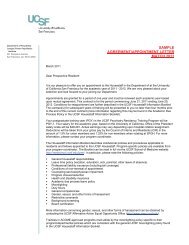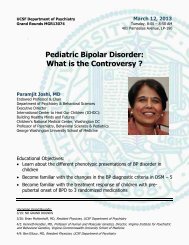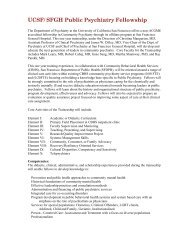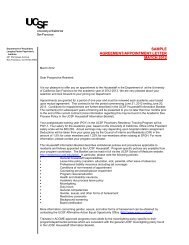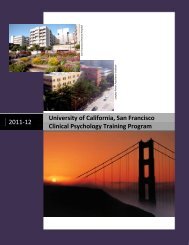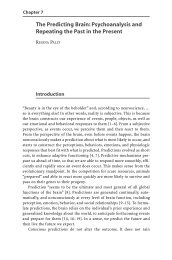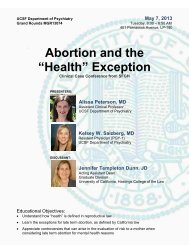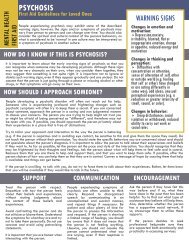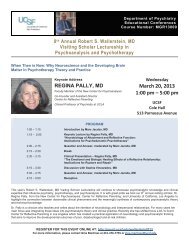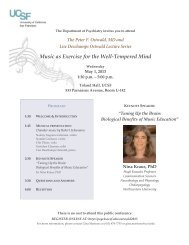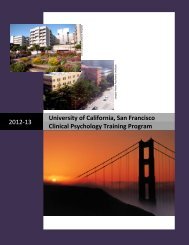Clinical Psychology Training Program - UCSF Department of ...
Clinical Psychology Training Program - UCSF Department of ...
Clinical Psychology Training Program - UCSF Department of ...
Create successful ePaper yourself
Turn your PDF publications into a flip-book with our unique Google optimized e-Paper software.
<strong>UCSF</strong> <strong>Clinical</strong> <strong>Psychology</strong> <strong>Training</strong> <strong>Program</strong><br />
Fellows in this area will become part <strong>of</strong> a newly emerging, multidisciplinary clinical research team, the Pain<br />
Management <strong>Clinical</strong> Research Team. The PMCRT is developing programmatic, effectiveness-based, treatment<br />
outcome investigations evaluating the roles <strong>of</strong> cognition and affect mediating the management <strong>of</strong> acute and chronic<br />
pain, focused especially on diverse, multicultural and underserved populations. Several projects have been<br />
designed for investigation at different time frames in the course <strong>of</strong> an individual’s treatment to address a central<br />
issue, namely, investigating the extent to which motivational strategies can enhance engagement, utilization and<br />
maintenance <strong>of</strong> multidisciplinary treatments for chronic, persistent physical pain.<br />
d) Mentors: James L. Sorensen, Ph.D., and Valerie Gruber, Ph.D.<br />
Research Area: Substance Abuse Research-Practice Linkages<br />
Primary Research Mentor:<br />
Primary <strong>Clinical</strong> Supervisor:<br />
James Sorensen, Ph.D.<br />
Valerie Gruber, Ph.D.<br />
<strong>Training</strong> in the Substance Abuse Research-Practice Linkages area focuses on narrowing the gap between<br />
research and clinical practice in substance abuse treatment. Fellows develop skills in conducting clinical<br />
assessment, treatment, and research in drug treatment programs. Fellows have the opportunity to develop<br />
evidence-based treatment innovations for use with substance use and co-occurring psychiatric and medical<br />
conditions.<br />
Consistent with its mission, this training area is set within the Division <strong>of</strong> Substance Abuse and Addiction<br />
Medicine at San Francisco General Hospital. The Division <strong>of</strong> Substance Abuse and Addiction Medicine provides<br />
state-<strong>of</strong>-the-art substance abuse treatment including on-site mental health and medical services, with an emphasis<br />
on understanding and treating clients within the context <strong>of</strong> their culture. <strong>Program</strong>s include a methadone clinic,<br />
<strong>of</strong>fice-based opiate treatment, and outpatient programs specializing in the treatment <strong>of</strong> cocaine and<br />
methamphetamine use disorders. The majority <strong>of</strong> clients have HIV, Hepatitis C or other chronic medical<br />
conditions. Many have post-traumatic stress, bipolar, attention deficit, and personality disorders, and substantial<br />
numbers have chronic drug induced or previously undetected psychotic disorders. Clients include large proportions<br />
<strong>of</strong> African-American, Latino, Asian Pacific Islander, and Native American individuals, as well as large proportions<br />
<strong>of</strong> gay, lesbian, bisexual, and transgender individuals. These programs have been the site <strong>of</strong> 40 funded research<br />
investigations <strong>of</strong> psychological, social, and biologically-based treatment innovations.<br />
Fellows choosing to train in the Substance Abuse Research-Practice Linkages area gain experience conducting<br />
clinically relevant research and implementing research-based interventions in clinical settings serving diverse<br />
urban client populations. Fellows have the opportunity to develop and test improved psychological interventions<br />
for substance abuse or dependence, and related psychological or medical problems.<br />
Fellows may also join in research activities through the California-Arizona Research Node <strong>of</strong> the <strong>Clinical</strong><br />
Trials Network, and through the San Francisco Treatment Research Center. These NIDA-funded center grants<br />
focus on research that improves drug abuse treatment. Dr. Sorensen is Principal Investigator for the California-<br />
Arizona Research Node <strong>of</strong> the <strong>Clinical</strong> Trials network, and Dr. Gruber is co-investigator. Fellows can participate<br />
in the evaluation <strong>of</strong> treatment innovations and develop their own research using intramural or extramural funding.<br />
Faculty<br />
Drs. Sorensen and Gruber are the primary mentors in this research track.<br />
The Public Service and Minority Cluster faculty includes Daniella Cortez Cavenagh, Ph.D., Valerie Gruber,<br />
Ph.D., Vanessa Kelly, Psy.D., Alicia F. Lieberman, Ph.D., Miriam Martinez, Ph.D., Ricardo F. Muñoz, Ph.D.,<br />
Eddie Ong, Ph.D., Stephen Rao, Ph.D., Susan Scheidt, Psy.D., and James L. Sorensen, Ph.D. (cluster leader).<br />
11



